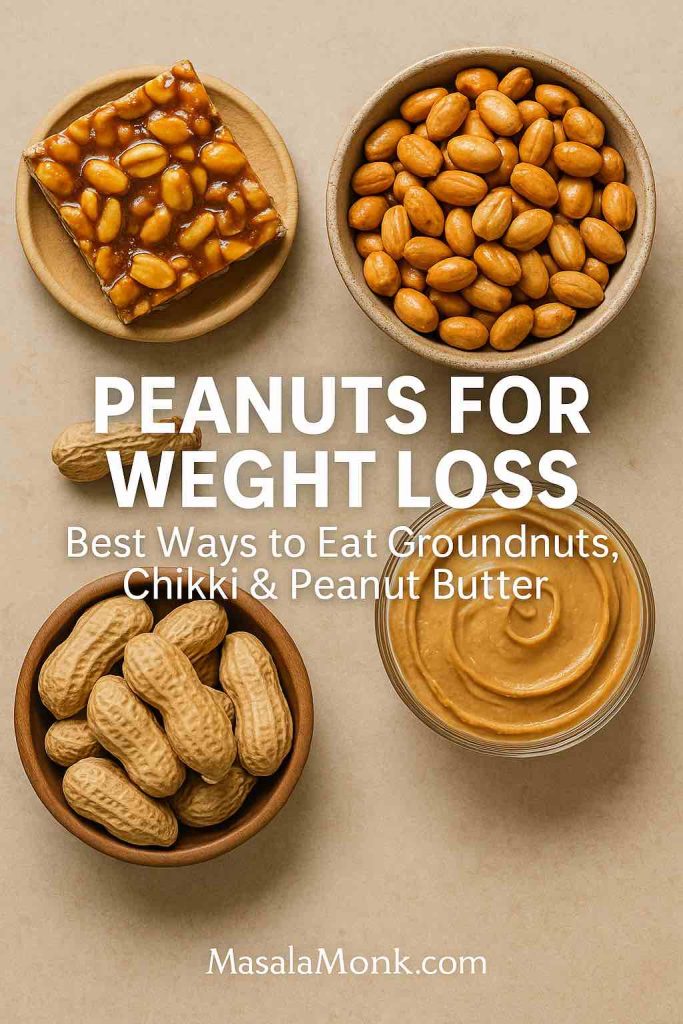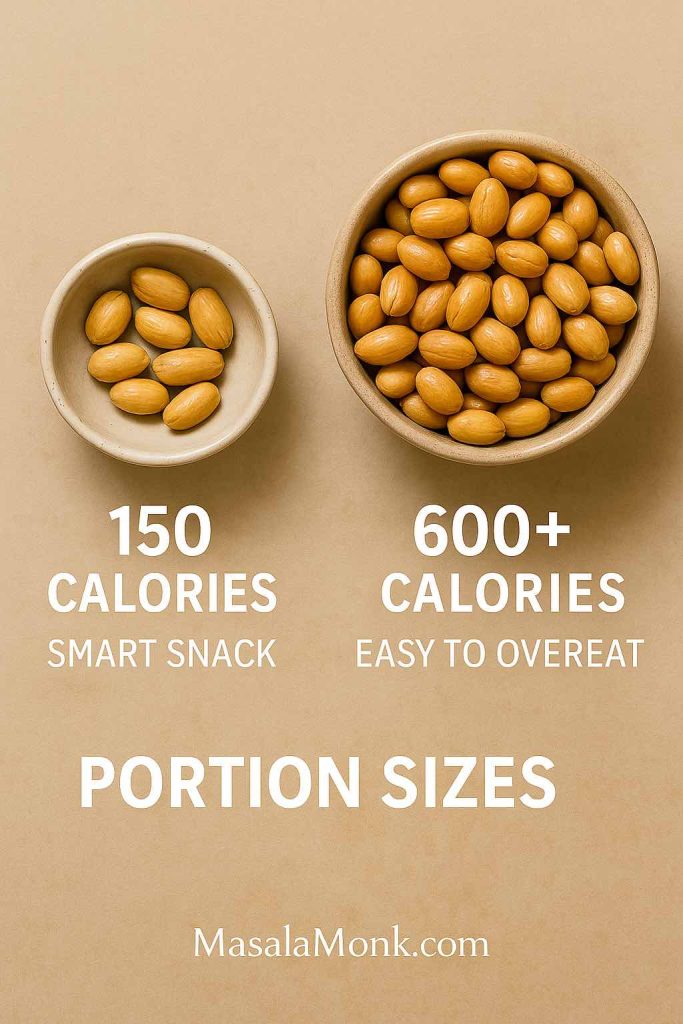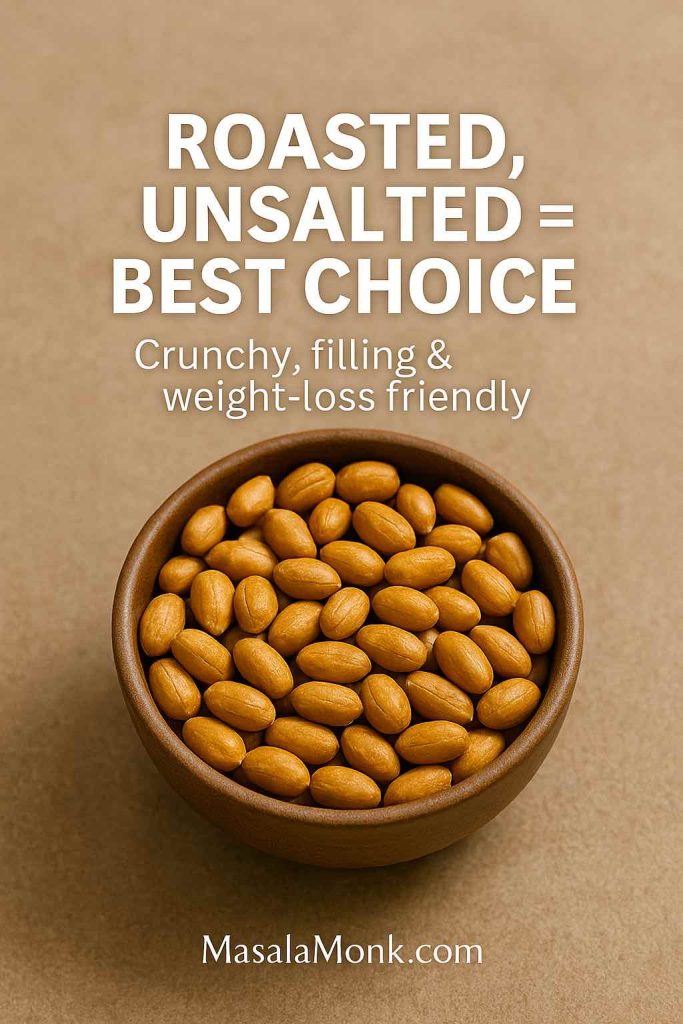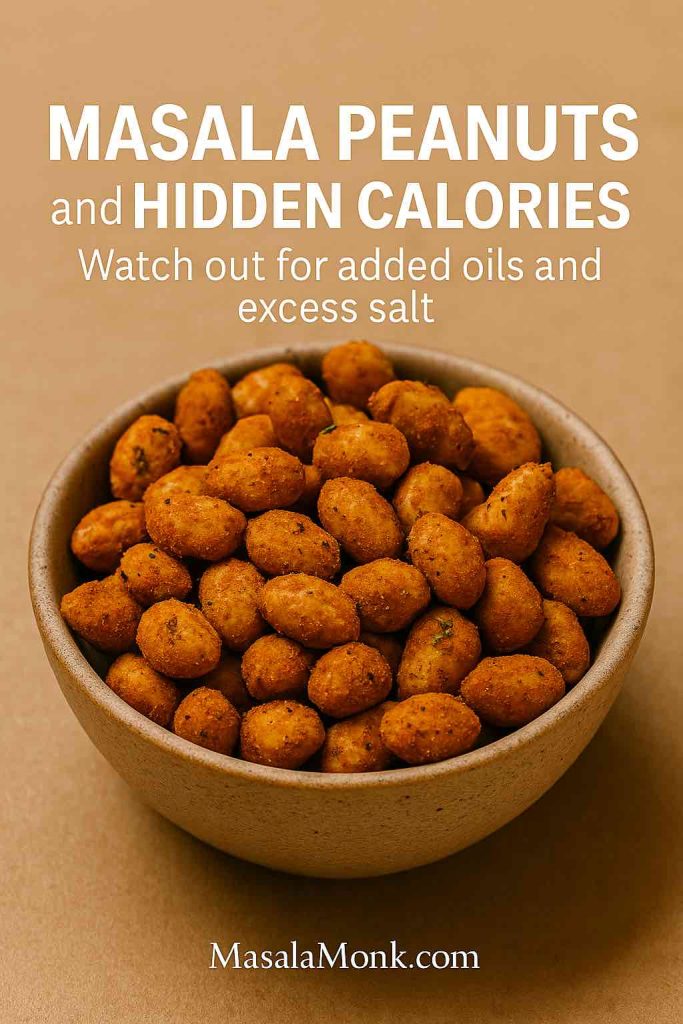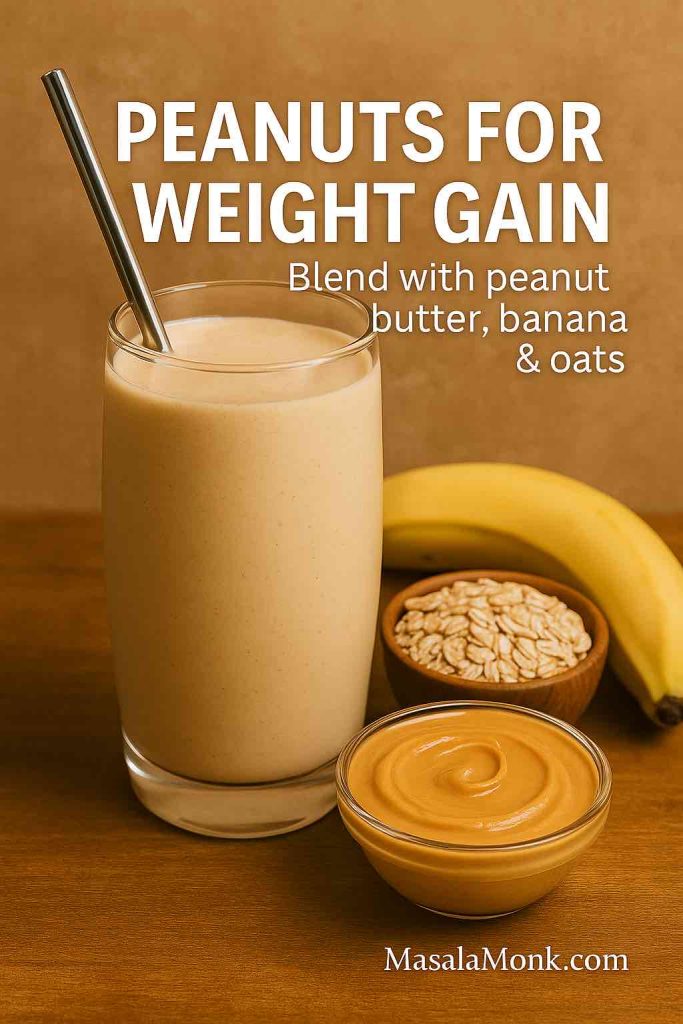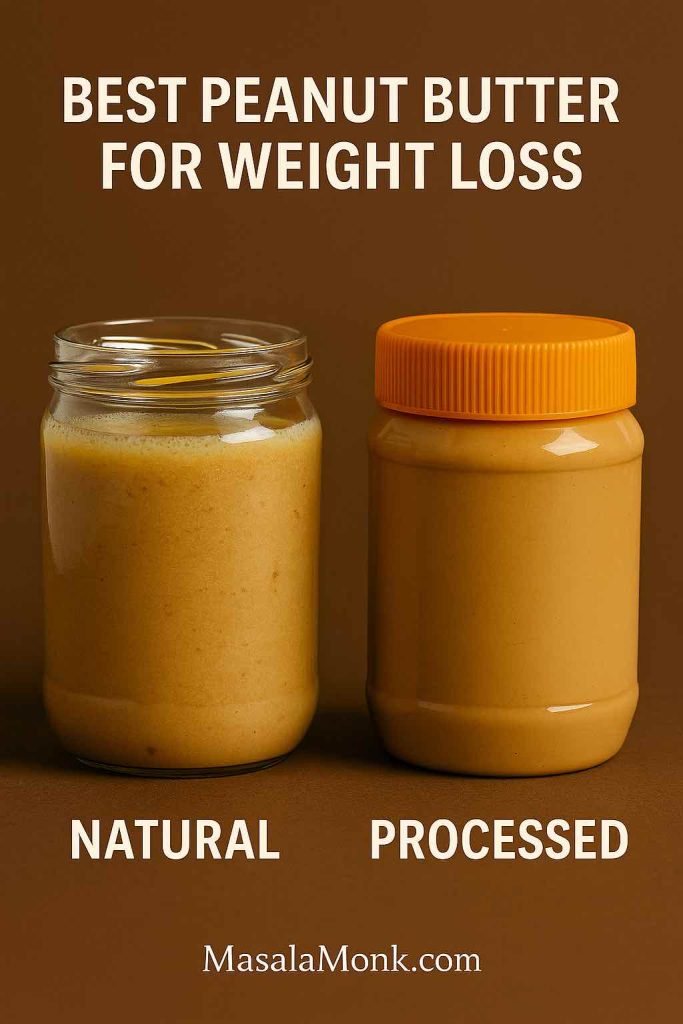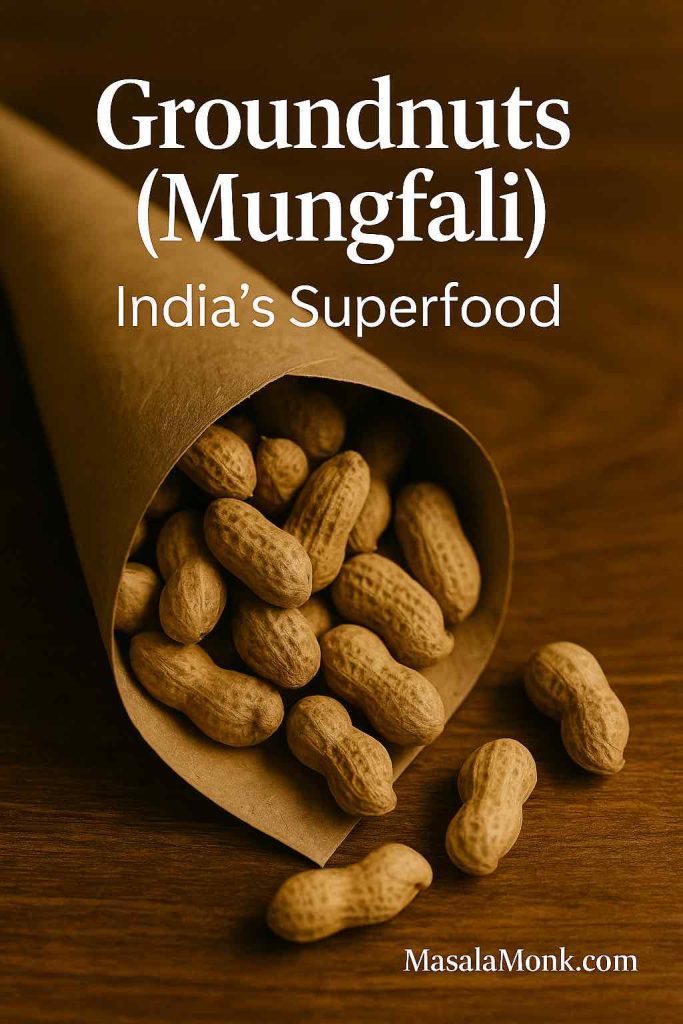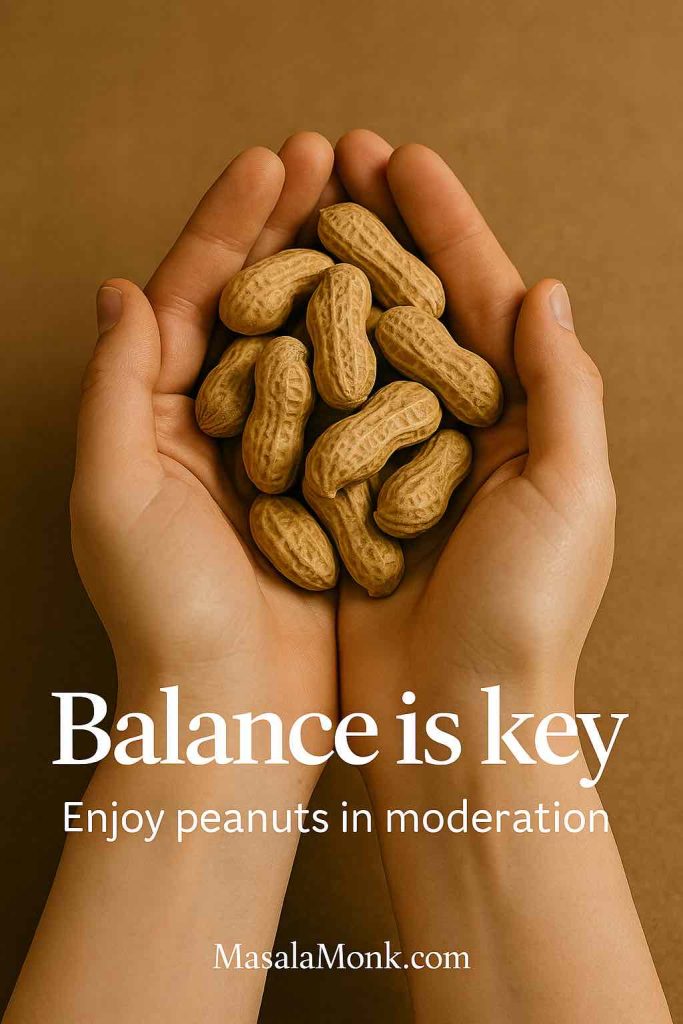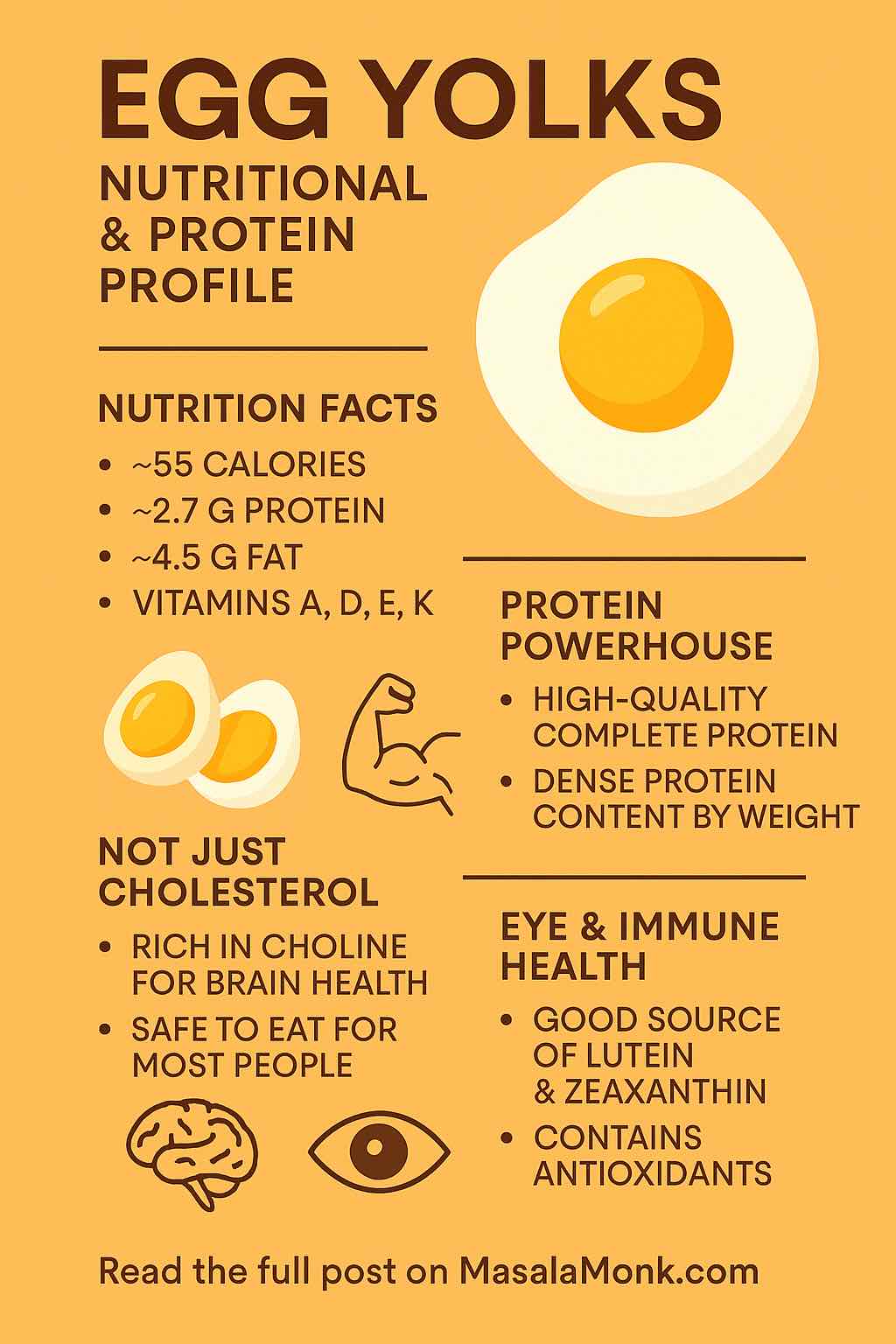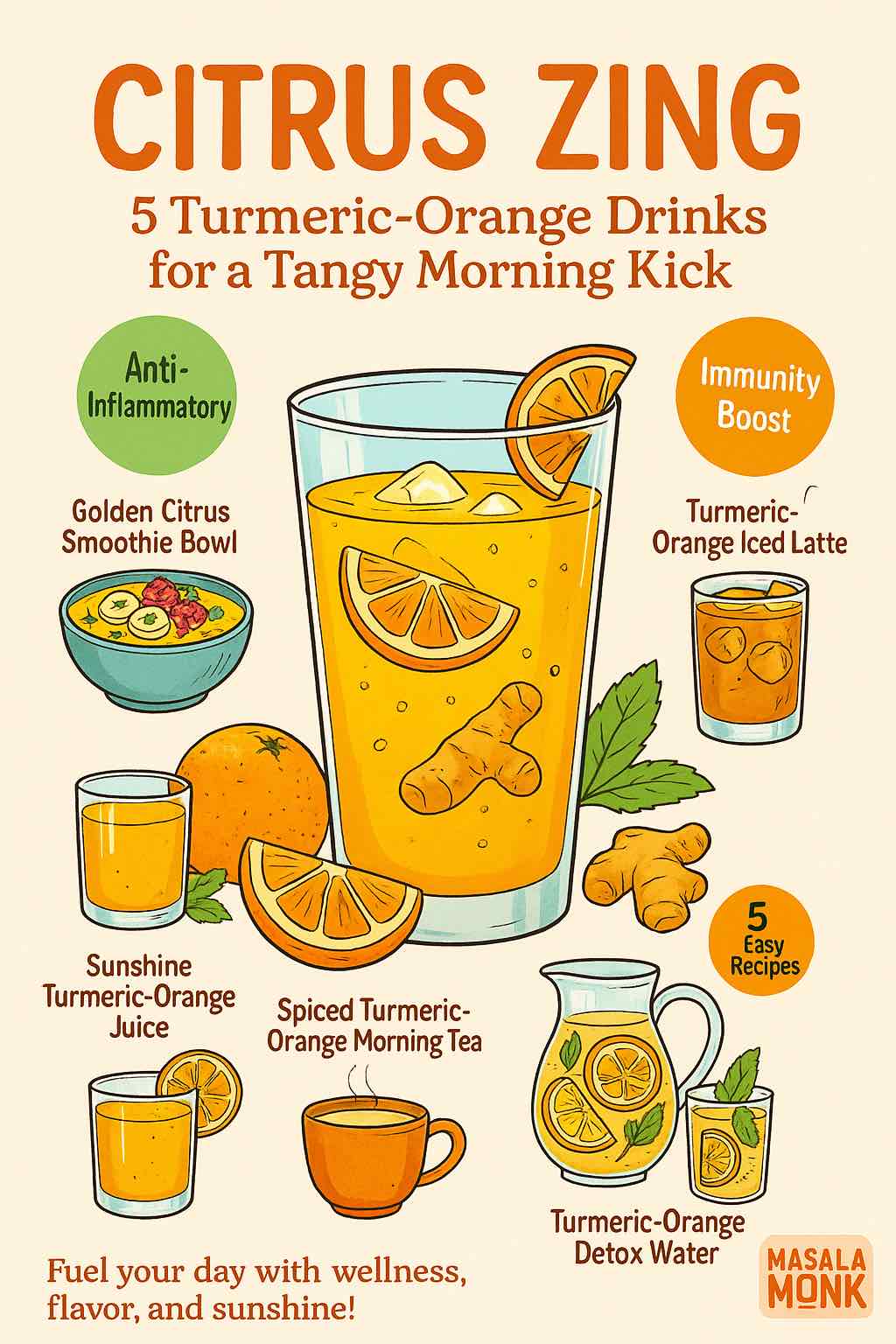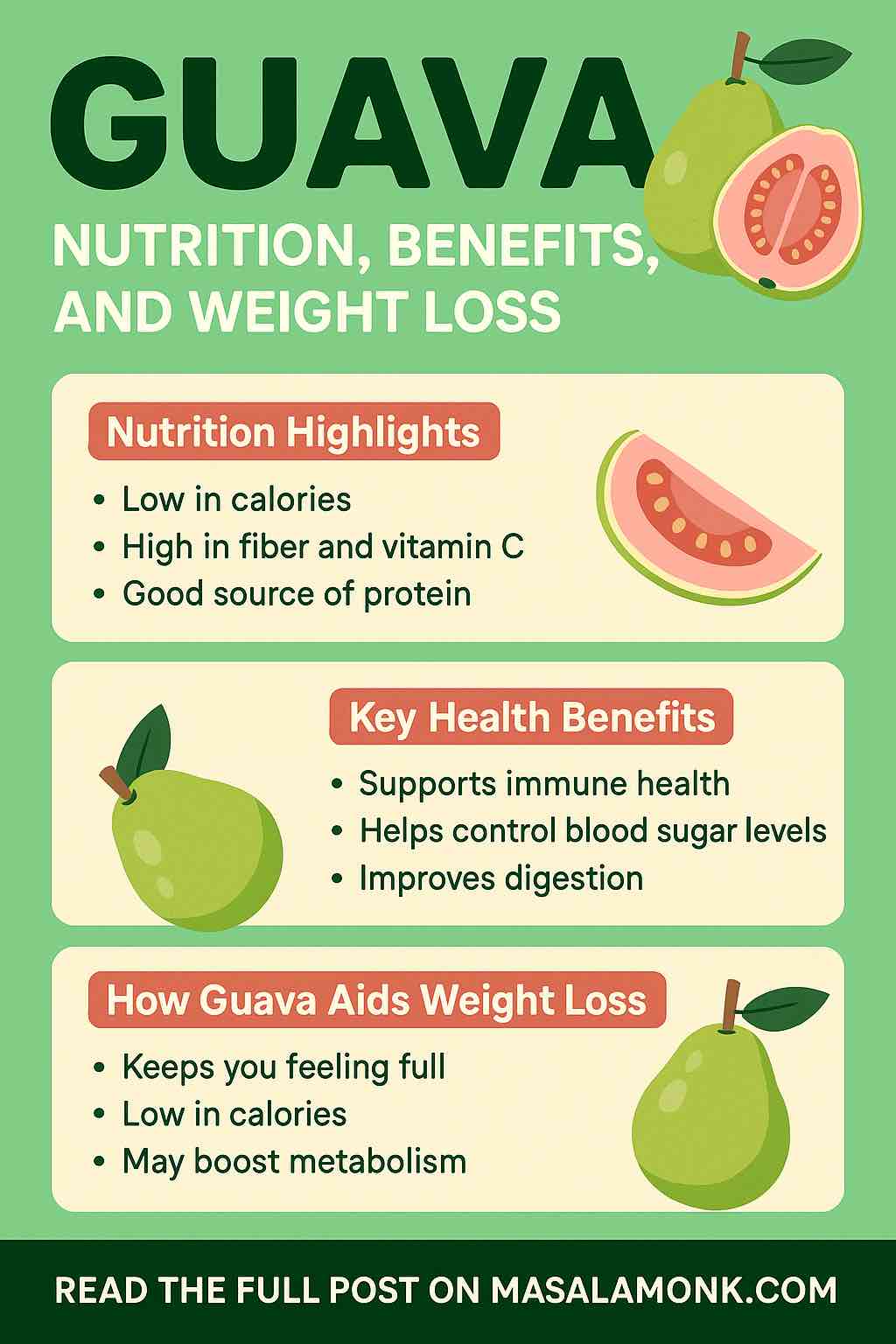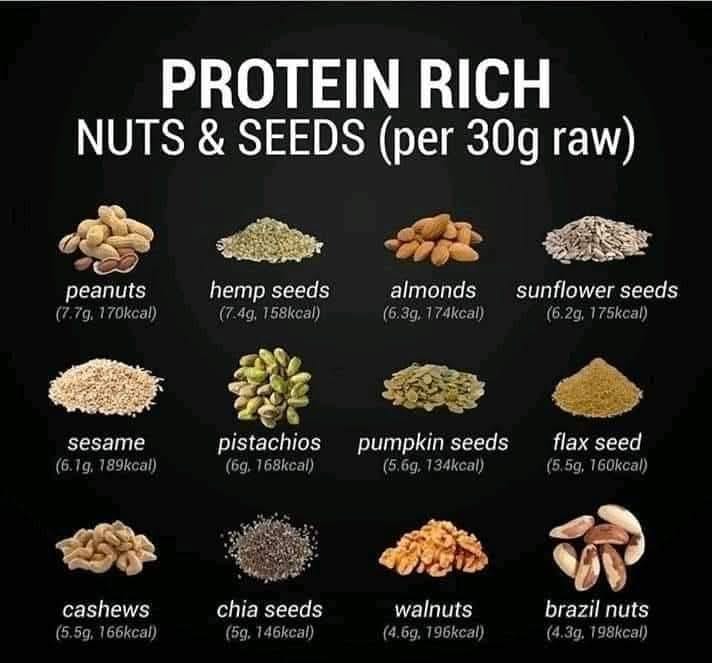
Steady energy matters on real days, not perfect ones. The highest protein nuts & seeds offer a tiny, portable fix that works at breakfast, at your desk, and after dinner. Moreover, they bring protein for fullness, fiber for appetite control, and unsaturated fats for smooth, even energy. Protein’s satiety edge is well documented—see Paddon-Jones et al.—and soluble fibre further prolongs fullness (Salleh et al.).
In practice, that means fewer spikes, fewer dips, and far fewer raids on the snack cupboard. Protein-forward, solid foods generally suppress appetite more than carb-dominant choices (Carreiro et al.). Additionally, these foods fit into what you already cook, so you won’t need new routines. Ultimately, consistency wins, and these ingredients make it easy to be consistent.
Also Read: How to Eat 100 Grams of Protein a Day.
Why the Highest Protein Nuts & Seeds Matter All Day
First, protein is the most reliable driver of satiety for many people. Consequently, even a modest serving can reduce between-meal grazing. Reviews consistently place protein above carbohydrate and fat for both satiation and satiety (Morell & Fiszman; Paddon-Jones et al.). Next, fiber and healthy fats slow digestion, which gently extends that fullness (Salleh et al.).
Meanwhile, convenience changes outcomes. Nuts and seeds sit happily in a jar, a locker, or a bag. Furthermore, they require no special prep, no gadgets, and almost no time. Finally, they taste good, which is why the habit sticks after the first week.
Importantly, the highest protein nuts & seeds carry helpful micronutrients. For example, iron supports vitality, magnesium steadies muscles and sleep, zinc backs immunity, vitamin E acts as an antioxidant, and plant omega-3 ALA supports heart and brain health. As a result, small servings do double duty. For plant omega-3 ALA basics and how it differs from EPA/DHA, see Harvard Nutrition Source.
Also Read: Almonds Nutrition Facts 100g & Glycemic Index Impact
Quick Answer: The Highest Protein Nuts & Seeds at a Glance
Peanuts are the highest-protein nut most people eat daily, while hemp seeds are the highest-protein seed. Per 100 g, peanuts typically deliver 24–26 g protein; meanwhile, hemp seeds reach 31–32 g. Scaled to a realistic serving—about 28–30 g for a small handful or seed sprinkle—that becomes ~7 g for peanuts and ~9–10 g for hemp. Additionally, pumpkin and sunflower seeds sit close behind; almonds, pistachios, and cashews hover near ~6 g per serving; walnuts contribute less protein yet bring valued omega-3 ALA. Therefore, once you know this orientation, every other choice becomes easier, calmer, and faster.
- Top seed for density: Hemp hearts (~31–33 g protein per 100 g).
- Top nut for density: Peanuts (~24–26 g per 100 g).
- Elite runner-up seed: Pumpkin seeds (pepitas) (~30 g per 100 g).
- Consistent six-gram players per serving: Sunflower kernels, almonds, pistachios.
- Solid but slightly lower: Cashews, flax, chia.
- Lower protein yet valuable omega-3 ALA: Walnuts.
In everyday servings of 28–30 g, expect hemp hearts ~9–10 g, pepitas ~8.5–9.5 g, peanuts ~7 g, almonds/pistachios/sunflower ~6 g, cashews/flax/chia ~5–6 g, and walnuts ~4–5 g. Notably, once you scale to real portions, the differences compress.
Data note: Macro values (protein, fat, carbs) come from USDA FoodData Central and USDA-derived tables via MyFoodData.
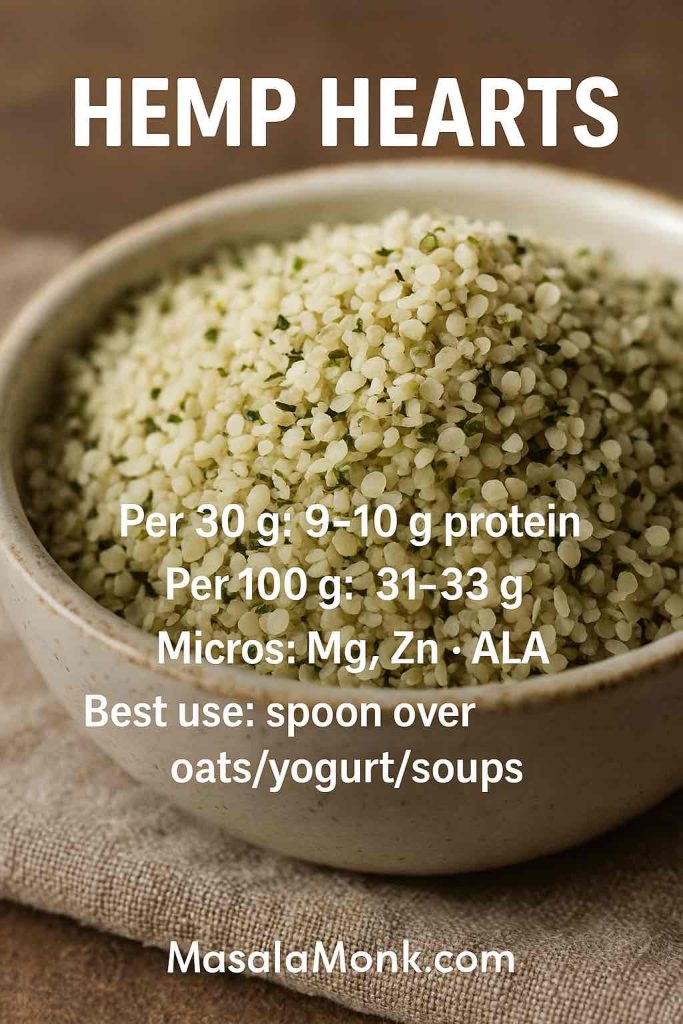
The Density View: Highest Protein Nuts & Seeds per 100 g
A per-100 g view reveals pure protein density—useful for recipe planning, bulk mixing, and comparing options fairly. Ranges reflect real-world variation in roasting, moisture, and variety; nevertheless, the ranking holds up and remember that most people eat ~30 g at a time.
- Hemp hearts: ~31–33 g
- Pumpkin seeds (pepitas, shelled): ~30 g
- Peanuts (dry-roasted): ~24–26 g
- Almonds: ~21–22 g
- Pistachios: ~20–21 g
- Sunflower kernels: ~20–21 g
- Flax (alsi): ~18 g
- Sesame (til): ~17–18 g
- Chia: ~16–17 g
- Walnuts (akhrot): ~14–15 g
- Brazil nuts: ~14–15 g (modest protein; exceptional selenium)
Strictly by density, hemp leads the field, and peanuts lead the nuts. However, most people do not eat 100 g at once; consequently, the serving-level lens matters even more.
Also Read: Glycemic index of Chia Seeds and their effectiveness on Blood Sugar
Highest Protein Nuts & Seeds by Serving (28–30 g)
Once you shift from the lab bench to the palm of your hand, the field compresses in a reassuring way. In practice, a standard nut/seed serving is 28–30 g (roughly a small handful or 2–3 tablespoons, depending on the item).
- Hemp seeds: ~9–10 g per 30 g
- Pumpkin seeds: ~8 g
- Peanuts: ~7 g
- Almonds / Sunflower / Pistachios: ~6 g
- Cashews / Flax / Chia: ~5–6 g
- Walnuts: ~4–5 g
Accordingly, most servings of the highest protein nuts & seeds deliver ~5–10 g protein. Therefore, you can choose by taste, texture, budget, and purpose, then nudge the number upward with a tablespoon of hemp or an extra sprinkle of pumpkin or sunflower whenever you wish.
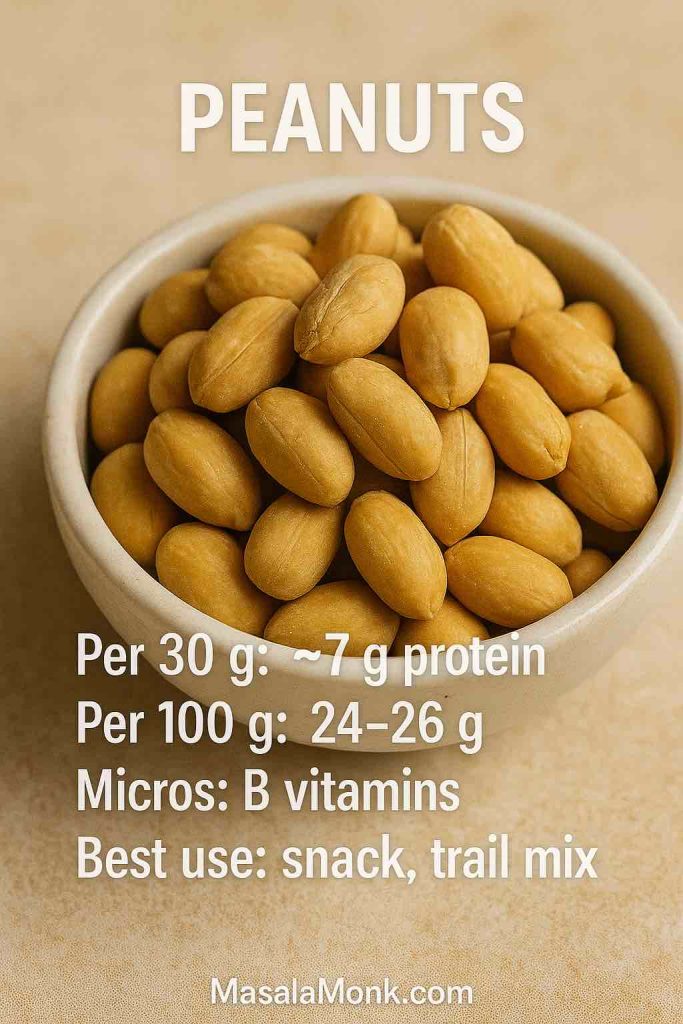
The Spoon View: Nut Butters, Tahini, and Easy Boosters
Some days, a spoon is the strategy. Moreover, spoons are predictable, so the numbers stay honest.
- Peanut butter: 1 Tbsp (~16 g) ≈ 4 g protein; 2 Tbsp (~32 g) ≈ 8 g (MyFoodData: Peanut butter).
- Almond butter: slightly lower per spoon than peanut butter.
- Tahini: ~5 g per 2 Tbsp (~30 g).
- Hemp hearts: ~9–10 g per 3 Tbsp (~30 g) → ~3+ g per Tbsp.
- Pepitas: ~3 g per Tbsp (~9–10 g by weight).
Almond butter typically trails slightly. Additionally, many “high-protein” nut butters add pea or whey; sometimes that helps, yet sometimes it merely raises the label claim. Alternatively, keep a nut butter you love and lift protein on demand with a tablespoon of hemp or a scatter of pumpkin seeds over yogurt, oats, or toast. Consequently, the flavor remains yours while the protein numbers climb without effort.
Also Read: Keto Chia Pudding Recipe with Almond Milk
The Tiny-Count Cheat Sheet: Quick Mental Math for Real Life
Life isn’t always measured in grams; consequently, these approximations of protein per nut or seed would help you decide quickly:
- 1 almond (badam): ~0.25 g protein
- 10 almonds: ~2.5 g
- 1 peanut kernel: ~0.25 g
- 10 peanuts: ~2.5 g
- 1 walnut half: ~0.6 g (≈ 1.2 g per whole walnut)
- 50 g peanuts: ~12–13 g
- 100 g peanuts: ~24–26 g
- 100 g almonds: ~21–22 g
- 100 g pumpkin seeds: ~18–20 g
- 100 g hemp seeds: ~31–32 g
- 1 tbsp peanut butter (~16 g): ~4 g; 2 tbsp (~32 g): ~8 g
Yes, sizes and roasts vary slightly; nevertheless, these figures are reliable enough for daily planning and shopping.
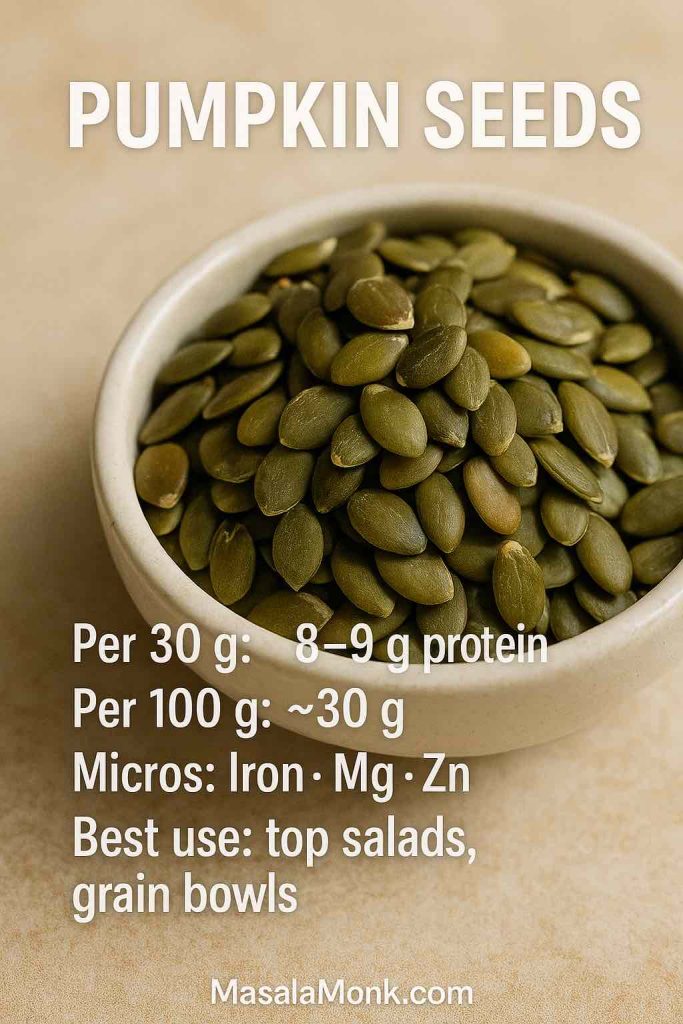
Seeds or Nuts? Choosing the Highest Protein Nuts & Seeds With Intent
Decision-making gets easier when aim leads and appetite follows. Seeds often carry more protein per gram; nuts often deliver crunch, structure, and snack satisfaction. Thus, use this tidy lens:
- Maximise protein per bite: hemp, pumpkin, sunflower
- Best value with solid protein: peanuts
- Vitamin E with clean, crisp bite: almonds
- Plant omega-3 ALA: walnuts, ground flax, chia (ALA primer:Harvard Nutrition Source)
- Iron + magnesium + zinc: pumpkin first; hemp and sunflower as strong support
- Selenium (precise, potent): Brazil nuts—1–2 are typically enough (AJCN RCT)
Pick the quality that fits today’s goal; then choose the texture you actually enjoy. As a result, consistency becomes easy.
Also Read: Pumpkin Seed Smoothie for Weight Loss | 5 Healthy Recipes & Benefits
Texture, Roasting, and Seasoning: The Satisfaction Multiplier
Numbers get you to the shelf; mouthfeel keeps you reaching into the jar. Consequently, small technique shifts create a big payoff:
- Raw vs. roasted: light roasting (pan or oven) drives off a little moisture and unlocks aroma, so smaller portions feel complete. Keep heat moderate; oils should wake, not scorch. (Zhang et al., 2024).
- Salted vs. unsalted: if lightly salted makes the habit stick, start there. Subsequently, mix half salted with half unsalted to bring sodium down without losing satisfaction.
- Seasonings that earn their keep: chili-lime peanuts for brightness; cumin-salt pumpkin seeds for warmth; smoked-paprika almonds for evening snacking; lemon-sesame sunflower for lift. In turn, higher flavor density stabilises portion size naturally.
As satisfaction rises, portion anxiety falls. Therefore, you’ll find it easier to stop at enough.
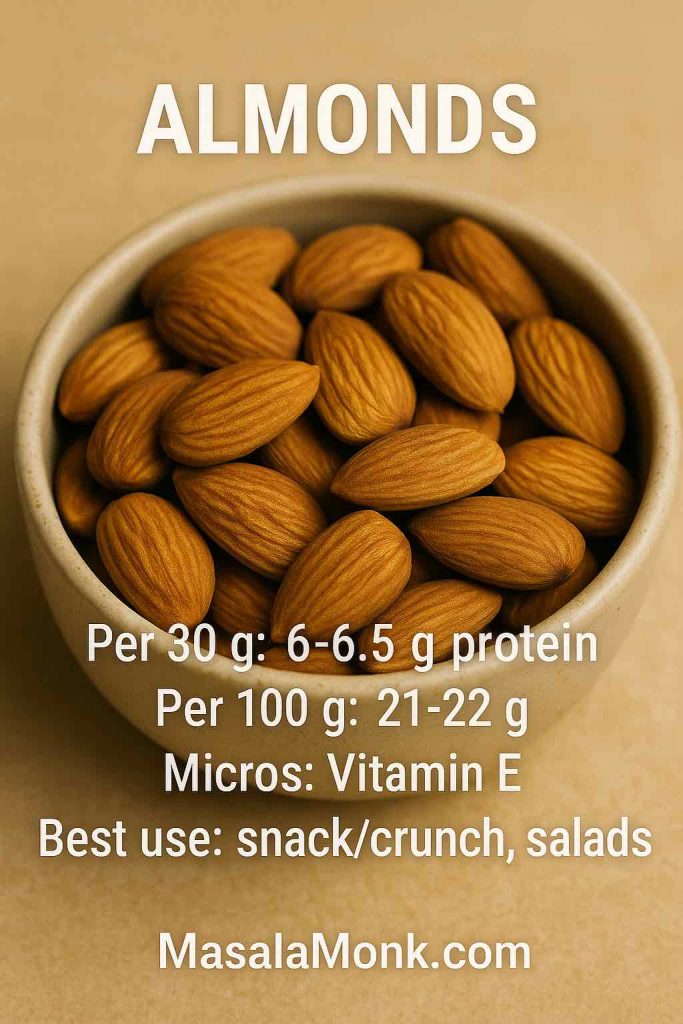
Micronutrient Tie-Breakers: When Protein Isn’t the Only Priority
Sometimes two choices tie on protein; consequently, minerals and vitamins decide the winner.
- Iron: choose pumpkin seeds; sunflower assists. A tablespoon over salad, dal, soup, or roasted vegetables is a frictionless upgrade.
- Vitamin E: choose almonds. A handful in the afternoon—or chopped over breakfast—keeps intake steady.
- Selenium: choose Brazil nuts. One or two often meet daily needs; more isn’t necessary.
- Omega-3 ALA: rotate walnuts, ground flax, and chia. Different textures; same benefit.
- Magnesium & zinc: choose pumpkin and hemp for consistent support of muscle function, sleep quality, and immunity.
- B-vitamins: choose peanuts and sunflower for reliable contributions to metabolism and nervous-system health.
Viewed this way, the highest protein nuts & seeds become a toolbox rather than a contest.
Also Read: Best Nuts and Seeds for Weight Loss (Chia, Flax, Almonds & More)
Buying and Storing the Highest Protein Nuts & Seeds
Nuts and seeds look sturdy; their oils do not. Accordingly, handle them thoughtfully and they’ll taste vivid to the last serving. Freshness multiplies flavor, and flavor multiplies follow-through. Furthermore, storage is simple.
- Buy what you’ll finish in a few weeks; a lively small stash beats a tired bulk bargain.
- Store airtight, cool, and dark. Glass jars in a cupboard are ideal; warm counters are not.
- Refrigerate or freeze omega-3-rich options (walnuts, flax, chia) if the kitchen runs warm.
- Smell before you snack. Fresh smells round and nutty; rancid smells waxy or flat. Toasting may revive a slightly dull seed; nothing saves a truly rancid nut—bin it and move on.
With storage handled, value rises and waste falls.
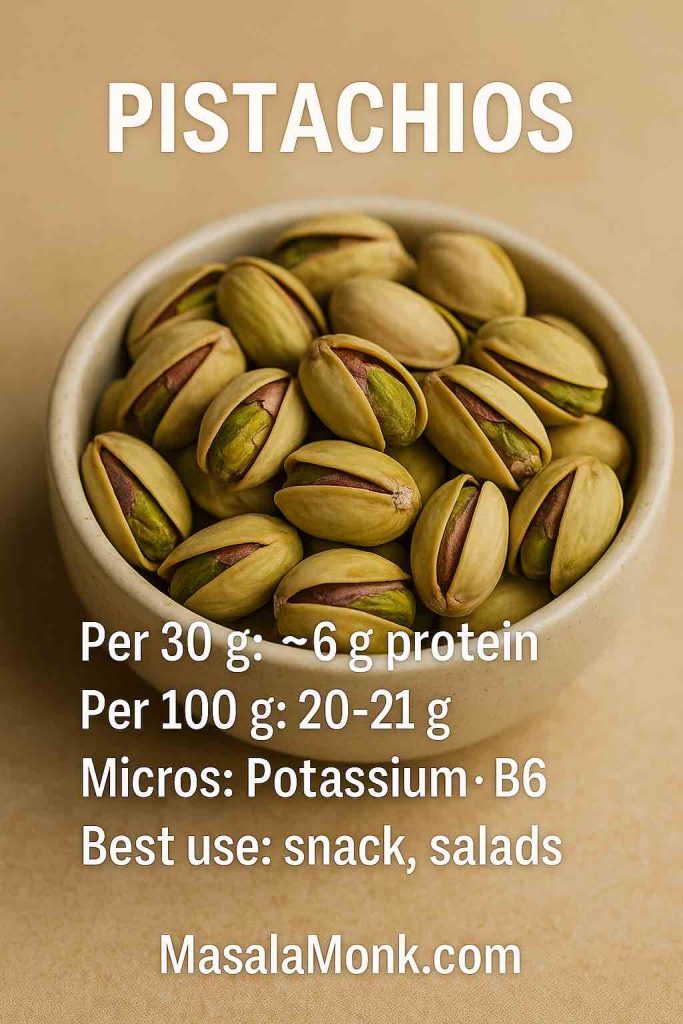
Price & Value: Protein You’ll Actually Eat
Value is not only the sticker price; it is also protein per currency, minerals per bite, and the likelihood you’ll reach for it daily.
- Peanuts: everyday champion—high protein, friendly price, universally seasonable.
- Sunflower seeds: budget-friendly seed with solid minerals.
- Pumpkin seeds: pricier, yet they repay with iron, magnesium, zinc, and deeply satisfying chew.
- Almonds: premium, yet vitamin E and that “clean crunch” justify their role.
- Hemp seeds: premium booster—one tablespoon strategically placed is often all you need.
Accordingly, a pragmatic pattern works best: build a base with peanuts or sunflower for affordability, then spike with pumpkin or hemp to raise protein and minerals without blowing the budget.
Also Read: The Power of Chia Seeds: 5 Plant-Based High-Protein Meal Prep Ideas
How to Use Nuts & Seeds All Day
Highest Protein Nuts & Seeds at Breakfast: Steady Mornings Without Effort
Oats with backbone
Stir a spoon of peanut or almond butter into hot oats; then finish with hemp and sliced banana. As a result, the bowl turns creamy, balanced, and genuinely sustaining.
Yogurt that eats like a meal
Thick yogurt or dahi, a handful of almonds for crunch, a spoon of chia or ground flax for fiber and omega-3s, berries for brightness, and a light drizzle of honey if you like. Consequently, protein rises and hunger drops.
A better smoothie
Milk or plant milk, frozen berries or banana, 1 tbsp nut butter, 1 tbsp hemp or pumpkin, a pinch of salt. Blend until silky. Typically, you’ll land in the 10–15 g range without using a powder.
Quick toast upgrades
Whole-grain toast with tahini and lemon; then sesame and a few chopped pistachios. Alternatively, peanut butter with sliced apple and a sprinkle of hemp. Small change, long runway.
Hot cereals beyond oats
Millet or ragi porridge finished with almond butter and sunflower seeds. Notably, the flavor is comforting while the macros are quietly stronger.
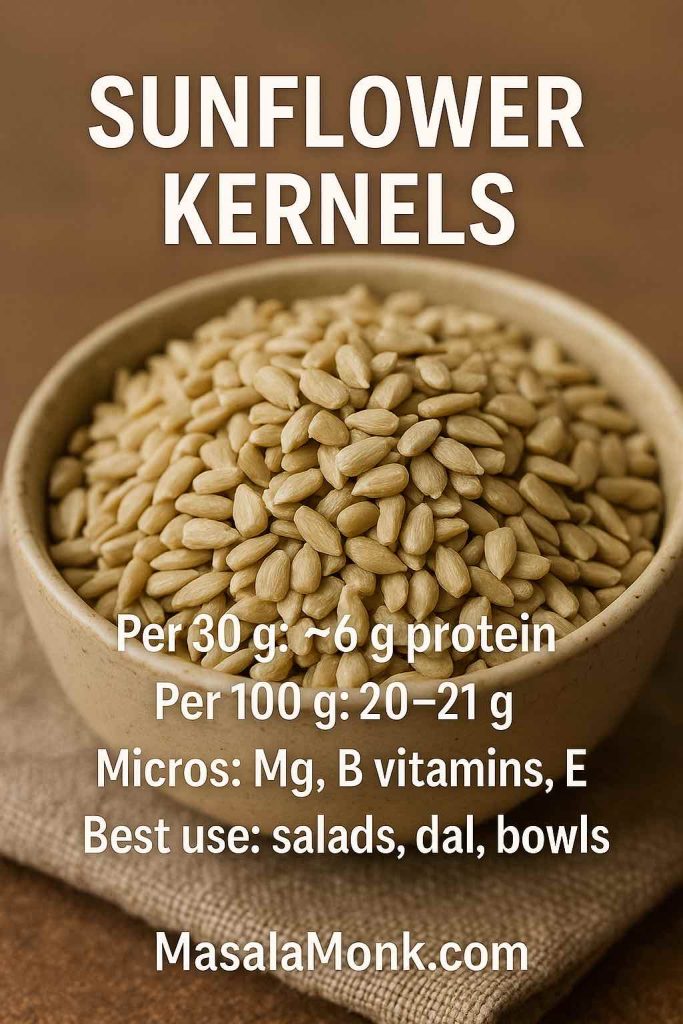
Highest Protein Nuts & Seeds at Lunch: Salads, Bowls, and Simple Structure
Leafy salad with substance
Leaves, chickpeas or boiled egg, chopped almonds or pistachios, tahini-lemon dressing; finally, sunflower seeds scattered at the end so they stay crisp. Consequently, the bowl moves from “nice” to “complete.”
Warm grain bowl
Rice or quinoa, roasted vegetables, a lemon-tahini drizzle, pumpkin and sunflower seeds to finish. Each bite has contrast—acid, fat, salt, crunch—and, importantly, steady protein.
Open-faced toast, grown up
Hummus or tahini-yogurt on a slice, cucumber ribbons, herbs, lemon zest, sesame. Satisfying yet light; easy to repeat throughout the week.
Dal and greens
Spinach dal or mixed-veg dal finished with cumin-garlic tempering and a handful of mixed seeds. Immediately, the texture improves and satiety rises without heaviness.
Also Read: Peanuts for Weight Loss: Best Ways to Eat Groundnuts, Chikki & Peanut Butter
Highest Protein Nuts & Seeds at Dinner: Generous Flavor Without Weight
Soups that finish strong
Tomato soup topped with pumpkin and sunflower; carrot-ginger with sesame; moong soup with roasted cumin and a final sprinkle of hemp. Thus, a simple bowl feels curated rather than plain.
Vegetables that eat like mains
Roasted cauliflower with tahini and pistachios; green beans finished with almonds and lemon; stuffed peppers with rice, cashews, and raisins. Consequently, vegetables carry the meal while nuts and seeds provide ballast and interest.
Stir-fries and quick sautés
Vegetables and tofu with a peanut-sesame crumble. Add the crunch during the last minute so it stays lively on the plate.
Grain-plus suppers
Couscous or broken wheat with roasted onions and peppers, then a warm dressing of olive oil, lemon, and tahini. Sunflower and pumpkin seeds go on at the end. Simple, clean flavors; dependable protein.
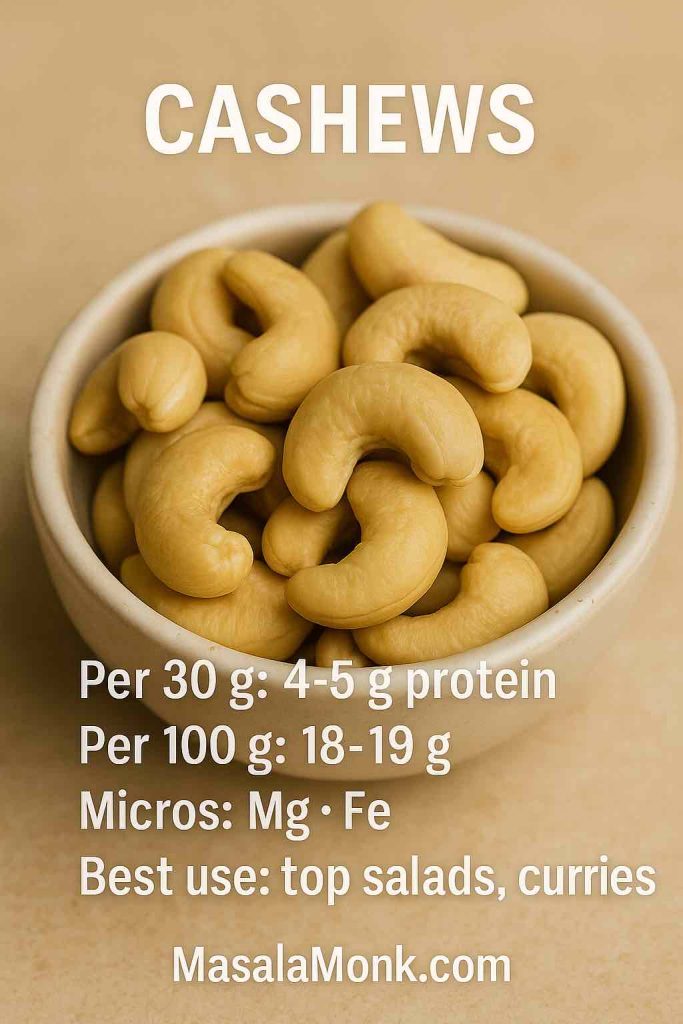
Snacks That Don’t Backfire: Steady Energy in Small Moves
Trail mix with intent
Base of peanuts and almonds for value and crunch; pumpkin for minerals; hemp sprinkled just before eating as the protein “top-coat.” Keep dried fruit modest so you snack for nourishment, not momentum.
The desk spoon
Jar of nut butter plus a tiny jar of hemp within reach. Spoon, sprinkle, done. Not fancy—effective.
Roasted seed cups
Dry-toast pumpkin and sunflower with a pinch of salt and cumin. Cool, jar, and keep by the kettle. A tablespoon at tea-time replaces handfuls of empty calories.
Crisp apple + nut butter
Two or three slices, a thin smear of peanut or almond butter, a dusting of cinnamon, and a few sesame seeds. The ratio is everything: more apple than spread, more satisfaction than effort.
Adding nuts does not derail body weight in trials; systematic reviews show neutral or favorable effects on weight and adiposity (SR/MA of RCTs & cohorts)
Also Read: Nuts for Heart Health: Harnessing the Nutritional Powerhouse for a Healthy Cardiovascular System
Match-Ups That Settle Everyday Debates
Almonds vs. Pepitas
Per 100 g, almonds show ~21–22 g protein; pumpkin shows ~18–20 g. Per serving, however, pumpkin often edges almonds (~8 g vs. ~6 g) because a spoonful compacts differently. For vitamin E, choose almonds; for iron, magnesium, zinc—and a slightly higher serving-level protein—choose pumpkin.
Peanuts vs. Almonds
Peanuts lead on density (~24–26 g vs. ~21–22 g). Per serving, the gap is modest (~7 g vs. ~6 g). Accordingly, pick peanuts for value and easy seasoning; pick almonds for vitamin E and a slightly leaner profile. Meanwhile, keep hemp hearts nearby to boost either option.
Walnuts vs. “Higher-Protein” Nuts
Walnuts won’t top protein charts; however, they headline plant omega-3 ALA. Consequently, if heart-friendly fats lead your goals, keep a daily walnut habit and let peanuts or almonds carry the heavier protein elsewhere.
Chia vs. Flax
Protein is similar. Still, chia gels beautifully—great for puddings and thick smoothies. Ground flax disappears into batters, rotis, dals, and porridges. Therefore, use both and let format guide the choice.
Sesame vs. sunflower
Sesame excels as a flavor amplifier (tahini, temperings, finishing sprinkles). Sunflower wins when you want more minerals per handful at a modest price. Together, they make an excellent pantry pair.
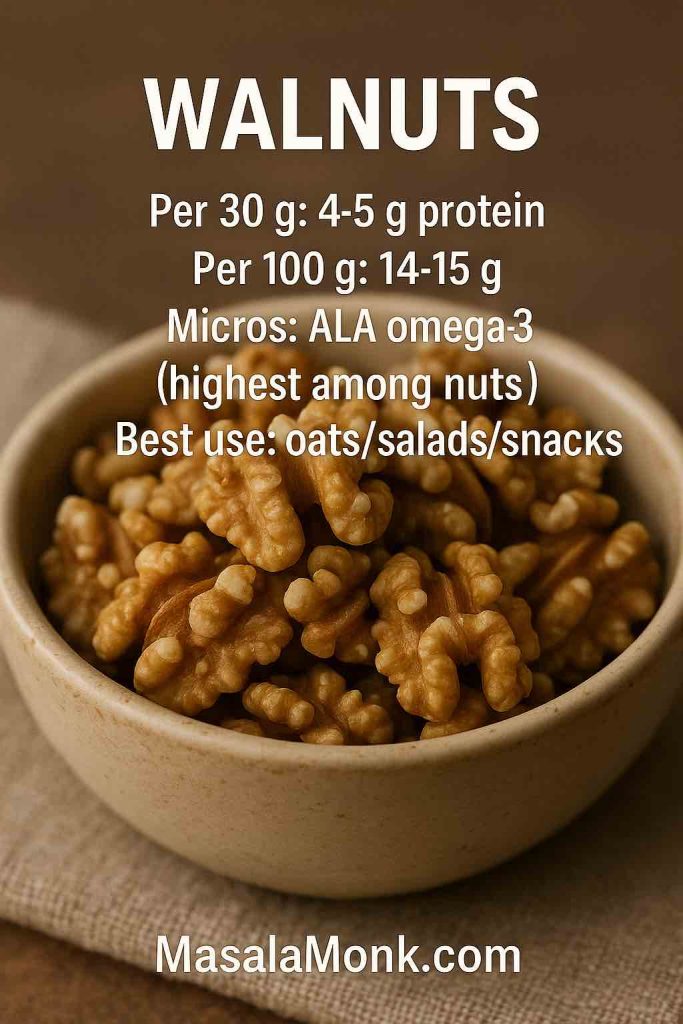
Strategic Mixes: Building a High-Impact Jar of the Highest Protein Nuts & Seeds
A smart mix balances protein, minerals, cost, and mouthfeel. Here are three blends that work in real life; moreover, each one uses the highest protein nuts & seeds as anchors.
1) Everyday Value Mix
- Peanuts (50%) + Sunflower (25%) + Pumpkin (20%) + Hemp (5%), lightly salted.
Result: budget-friendly, ~6–7 g protein per 30 g, iron and magnesium uplift, gentle crunch plus soft hemp specks. Consequently, you’ll actually finish the jar.
2) Iron-Forward Green Mix
- Pumpkin (40%) + Sunflower (30%) + Almonds (20%) + Sesame (10%), cumin-salt seasoned.
Result: iron, zinc, and vitamin E in one jar; excellent over salads, soups, and veg bowls. Additionally, sesame boosts aroma without dominating.
3) Premium Protein Booster
- Hemp (35%) + Pumpkin (30%) + Pistachio (20%) + Almond (15%), unsalted.
Result: ~8–9 g protein per 30 g with a refined texture; perfect as a topping rather than a graze. Therefore, a little goes a long way.
Store each mix airtight; rotate weekly to keep flavors lively.
Also Read: Walnut Benefits for Brain Health: Memory, Cognitive Function, and Mental Well-Being
Portions, Goals, and a Calm Plan That Sticks
Portions matter because nuts and seeds are calorie-dense. Even so, strict rules aren’t necessary.
Start with 28–30 g as a standard sprinkle or snack. Then, if you’re calibrating intake, measure a few times until your eyes learn the volume. Next, on training days or hungrier evenings, add a second sprinkle of pepitas or a spoon of hemp hearts. Finally, let weekly goals steer micro-moves: more protein (add hemp/pepitas), more iron (prioritize pepitas), more omega-3 (rotate walnuts/chia/flax), or simpler mornings (keep nut butter visible).
Common Mistakes (and Simple Fixes) When Using the Highest Protein Nuts & Seeds
- Buying too much at once.
Fix: purchase smaller amounts more often; freshness beats bulk every time. - Under-seasoning.
Fix: add light salt and a signature spice (cumin, chili-lime, smoked paprika). Consequently, small portions feel complete. - Relying on a single type.
Fix: keep two daily staples (e.g., peanuts + almonds) and one rotating seed booster (hemp or pumpkin). Variety improves nutrients and prevents boredom. - Forgetting the “last-minute” sprinkle.
Fix: store a seed jar near the stove. Meanwhile, add a teaspoon to anything that leaves the pan. - Ignoring storage temperature.
Fix: refrigerate or freeze walnuts, flax, and chia in warm kitchens. Ultimately, flavor and shelf life improve.
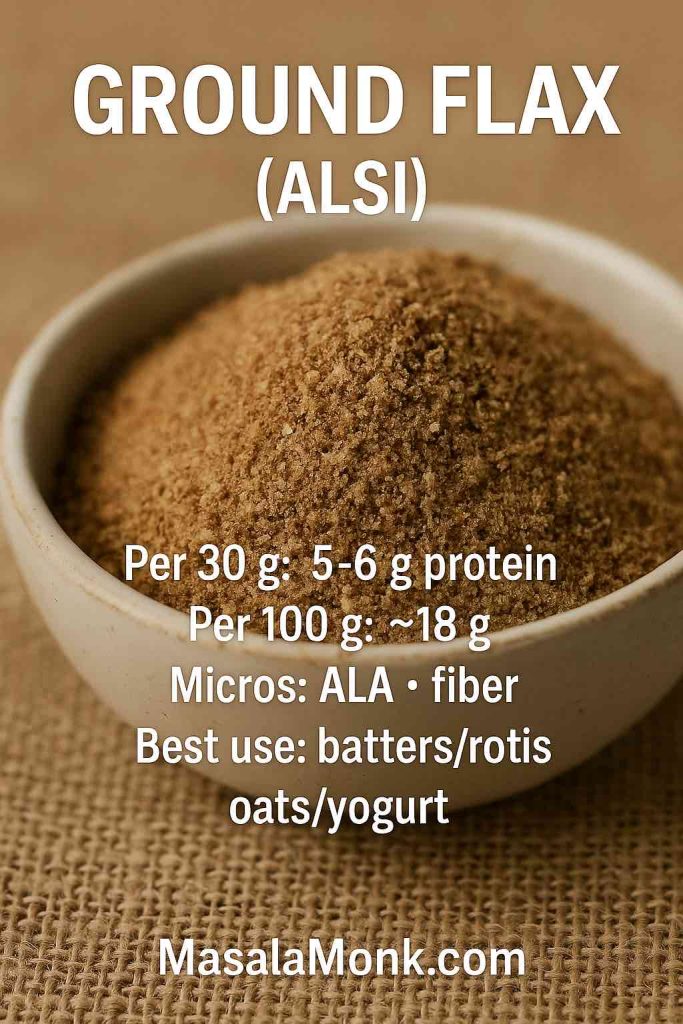
A Seven-Day Meal Plan with Highest Protein Nuts & Seeds
Monday
- Breakfast: oats with peanut butter + hemp hearts.
- Lunch: salad with chickpeas, almonds, sunflower; tahini-lemon dressing.
- Dinner: dal finished with cumin-garlic and pepitas.
Tuesday
- Breakfast: yogurt with chia, berries, and chopped almonds.
- Lunch: quinoa-vegetable bowl with tahini and sunflower kernels.
- Snack: a few walnuts for omega-3 ALA.
- Dinner: tomato soup topped with pepitas and sunflower.
Wednesday
- Breakfast: smoothie with almond butter, hemp hearts, berries, and a pinch of salt.
- Lunch: open-faced hummus toast with cucumber, herbs, lemon zest, and sesame.
- Dinner: green beans with toasted almonds and lemon; rice on the side.
Thursday
- Breakfast: oats with a tahini swirl, dates, and sesame.
- Lunch: roasted vegetables over warm grains with lemon-tahini; shower of pepitas.
- Snack: peanuts with a few dark-chocolate nibs.
- Dinner: carrot-ginger soup finished with sesame; small salad with sunflower.
Friday
- Breakfast: yogurt with ground flax and crushed pistachios.
- Lunch: quinoa bowl with pepitas and sunflower kernels.
- Dinner: roasted cauliflower with tahini and pistachios; crisp cucumbers.
Saturday
- Breakfast: omelet with chopped almonds and herbs.
- Snack: popcorn tossed with toasted pepitas and a whisper of chili-salt.
- Late snack: spoon of peanut butter with a dusting of hemp hearts.
Sunday
- Lunch: pilaf with cashews and raisins; side salad scattered with hemp hearts.
- Snack: walnuts and sliced fruit.
- Dinner: quick stir-fry finished with a teaspoon of mixed seeds; yogurt with chia for dessert.
Also Read: Cashews in the Morning: 5 High Protein Smoothie Ideas for Weight Loss.
Smart Swaps and Add-Ons for Instant Wins
- Upgrade any yogurt: add hemp hearts; if texture feels soft, toss in chopped almonds for contrast.
- Fortify porridge: swirl in nut butter while cooking; finish with pepitas.
- Boost salads: make tahini-lemon your house dressing; keep sunflower on the table.
- Elevate toast: spread tahini-yogurt, add herbs and lemon zest, and finish with sesame.
- Enrich soups: treat seed blends like croutons—crunch without heaviness.
- Power-up batters and doughs: add ground flax to pancakes, dosa/cheela batter, quick breads, and roti dough.
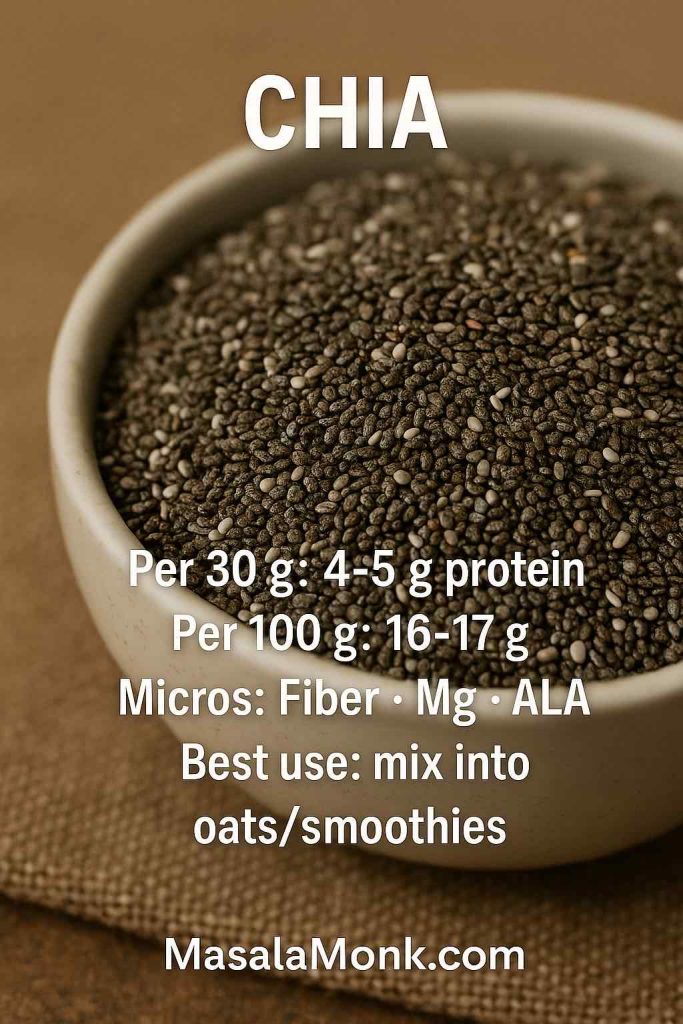
Regional and Cultural Touchpoints (Practical, Not Precious)
- Indian kitchens: stir ground flax into rotis; finish dal with pumpkin/sunflower; fold sesame into temperings; add peanuts to poha or chaat; spoon hemp onto curd rice or raita for a subtle boost.
- Mediterranean plates: lean on almonds and pistachios for crunch; use tahini (sesame) in sauces and dressings; finish grain salads with sunflower and pumpkin.
- East Asian flavours: highlight sesame oils and seeds; add peanuts to noodles and stir-fries; use chia for contemporary puddings.
- Western breakfasts: keep peanut/almond butter on the counter; rotate hemp and pumpkin into granola, yogurt bowls, and hot cereals.
These aren’t rules; rather, they’re ways to let the highest protein nuts & seeds slip into meals you already enjoy.
The Highest Protein Nuts & Seeds: Handy Reference Table
| Food (typical form) | Protein per 100 g | Typical serving (28–30 g) | Protein per serving | Bonus strengths |
|---|---|---|---|---|
| Hemp hearts | ~31–33 g | 30 g | ~9–10 g | Magnesium, zinc; neutral booster |
| Pumpkin seeds (pepitas) | ~30 g | 30 g | ~8.5–9.5 g | Iron, magnesium, zinc; great chew |
| Peanuts (dry-roasted) | ~24–26 g | 30 g | ~7 g | Value; B-vitamins; easy seasoning |
| Almonds | ~21–22 g | 28–30 g | ~6–6.5 g | Vitamin E; clean, crisp crunch |
| Pistachios | ~20–21 g | 28–30 g | ~6 g | Color, mild sweetness, snack appeal |
| Sunflower kernels | ~20–21 g | 30 g | ~6 g | Budget-friendly; mineral-rich |
| Cashews | ~18–19 g | 28–30 g | ~4–5 g | Creaminess; blends into sauces |
| Flax (ground preferred) | ~18 g | 28–30 g | ~5–6 g | ALA; disappears in doughs/batters |
| Chia | ~16–17 g | 28–30 g | ~5 g | ALA; gels for puddings/smoothies |
| Walnuts | ~14–15 g | 28–30 g | ~4–5 g | Highest ALA among nuts |
| Sesame (til) | ~17–18 g | 30 g | ~5–5.5 g | Tahini powerhouse; calcium |
| Brazil nuts | ~14–15 g | 28–30 g | ~4 g | Selenium standout (use 1–2) |
Note: whole, in-shell pumpkin seeds include a fibrous hull that dilutes protein density. Therefore, pepitas (shelled) are the reference used throughout the highest protein nuts & seeds guide.
Source & method: Unless noted, macro numbers are taken from USDA FoodData Central and presented using USDA-derived comparisons from MyFoodData (per 100 g and typical servings).
Advanced, Ultra-Practical Ideas (For Extra Mileage)
Protein-first breakfast parfait: Start with thick yogurt; fold in 1 Tbsp peanut butter; add 1 Tbsp hemp hearts; top with chopped almonds and berries. Consequently, you get creaminess, crunch, and a near-instant protein bump.
Savory oatmeal switch-up: Cook oats in milk or fortified plant milk; whisk in tahini and a pinch of salt; finish with pepitas and chives. As a result, you turn a sweet habit into a savory, satisfying bowl.
Sheet-pan seed topper: Mix pepitas, sunflower, and sesame with a teaspoon of oil, chili, and lemon zest; toast briefly. Then store in a jar. Subsequently, every soup, salad, or sauté gets a finishing spoon.
Five-minute noodle lift: Toss hot noodles with tahini-soy-lemon; add edamame if available; finish with crushed peanuts and hemp hearts. Accordingly, weeknights gain structure without heaviness.
Roasted-veg “crouton” trick: Swap bread cubes for a shower of toasted seeds. Consequently, you keep crunch while adding protein and minerals.
Portions, Goals, and a Plan You Can Live With
Nuts and seeds are calorie-dense; portions therefore matter. Even so, precision can stay gentle.
- Use 28–30 g as your default snack or sprinkle.
- Weigh that amount a couple of times; thereafter, your eyes will know.
- Training day or extra hunger? Add a spoon of hemp or an extra sprinkle of pumpkin and move on.
Let weekly themes steer micro-choices: more protein (add hemp most days), more iron (sprinkle pumpkin on what you already cook), healthier fats (rotate walnuts, flax, and chia), simpler breakfasts (keep nut butter visible instead of hidden). Consequently, you build consistency with minimal effort.
Final Take: The Highest Protein Nuts & Seeds Without Hype
Perfection isn’t the plan; repeatability is. Therefore, let hemp hearts and pepitas handle stealth protein boosts. Keep peanuts and sunflower as daily, budget-friendly anchors. Invite almonds for vitamin E and crisp satisfaction. Meanwhile, rotate walnuts, chia, and ground flax for omega-3 ALA. Additionally, use Brazil nuts thoughtfully for selenium.
For broader cardiometabolic reassurance, meta-analyses show favourable lipid effects with nut intake (61-trial analysis) and supportive links with cardiovascular risk (systematic review).
Above all, keep jars visible, place a scoop inside, and make topping a reflex. Then a handful between meetings, a spoon in a smoothie, or a teaspoon over soup becomes second nature. Ultimately, that’s how the highest protein nuts & seeds turn steady energy from a hope into a habit.
Also Read: Benefits of Flax Seeds and How to Incorporate Them into the Indian Diet
FAQs
1) Which nut has the most protein?
Peanuts come out on top among commonly eaten nuts at ~24–26 g protein per 100 g (that’s about ~7 g per 28–30 g serving). However, if you’re asking about tree-nuts only (i.e., excluding peanuts), then almonds and pistachios lead with ~21–22 g per 100 g (≈ ~6 g per serving).
2) Which seeds have the most protein?
For seeds, the champion is hemp hearts at ~31–33 g per 100 g (≈ ~9–10 g per 30 g). Meanwhile, pumpkin seeds (pepitas) follow closely at ~30 g per 100 g (≈ ~8–9 g per 30 g). Consequently, a single spoonful can quietly lift any meal.
3) Are nuts and seeds high in protein?
Yes—practically speaking, most deliver ~5–10 g protein per 28–30 g. As a result, they’re superb “easy add-ons” to keep you full and steady between meals.
4) Nuts vs. seeds: which have more protein?
Per 100 g, seeds generally edge out nuts (think hemp/pumpkin/sunflower > peanuts/almonds). Yet, per realistic servings, everything compresses to ~5–10 g, so you can choose by taste, texture, and budget—then simply boost with a tablespoon of hemp or a sprinkle of pepitas.
5) Highest-protein picks per serving (28–30 g)?
Hemp hearts ~9–10 g, pumpkin seeds ~8–9 g, peanuts ~7 g, almonds/pistachios/sunflower ~6 g, cashews/flax/chia ~5–6 g, and walnuts ~4–5 g. Therefore, the “per handful” gap is smaller than people expect.
6) Highest-protein picks per 100 g (density view)?
Hemp hearts (~31–33 g) > pumpkin seeds (~30 g) > peanuts (~24–26 g) > almonds (~21–22 g) ≈ pistachios/sunflower (~20–21 g) > flax (~18 g) > sesame (~17–18 g) > chia (~16–17 g) > walnuts/Brazil nuts (~14–15 g). Consequently, density helps for recipe planning and bulk mixes.
7) Which tree-nut has the most protein (excluding peanuts)?
Almonds and pistachios share the top spot at ~21–22 g per 100 g (≈ ~6 g per serving). In short, they’re your best tree-nut bets for protein.
8) Quick counts: how much protein per piece?
For fast mental math: 1 almond (badam) ≈ 0.25 g, 10 almonds ≈ 2.5 g; 1 peanut kernel ≈ 0.25 g, 10 peanuts ≈ 2.5 g; 1 walnut half (akhrot) ≈ 0.6 g (≈ 1.2 g per whole walnut). Handy for grazing and recipe tweaks.
9) Protein by the spoon: how much per tablespoon?
Peanut butter ≈ 4 g/Tbsp (16 g); almond butter ≈ 3–3.5 g/Tbsp; tahini (sesame) ≈ 2.5 g/Tbsp (≈ 5 g per 2 Tbsp); hemp hearts ≈ 3+ g/Tbsp; pepitas ≈ 3 g/Tbsp. Therefore, a spoon or two is a quick, honest lift.
10) Are peanuts really nuts?
Botanically, peanuts are legumes; nutritionally and in normal shopping, they behave like nuts. Consequently, most “highest-protein nuts” guides include them—because users (and labels) do.
11) Are nuts seeds?
Colloquially yes—nuts are hard-shelled seeds. However, in kitchens we separate nuts (almonds, cashews, walnuts) from edible seeds (hemp, pumpkin, sunflower, chia, flax) for clarity and recipe roles.
12) Best budget picks for protein?
Start with peanuts (value king) and sunflower seeds (budget minerals), then, importantly, spike with small amounts of pumpkin or hemp when you want extra protein and micronutrients.
13) Which are richest in iron, magnesium, and zinc?
Pumpkin seeds headline iron/magnesium/zinc; hemp and sunflower support closely. As a result, a tablespoon over salads, dal, soups, or roasted veg is a frictionless upgrade.
14) Which nuts are highest in vitamin E?
Almonds. Accordingly, keep a handful in the afternoon—or chop them over breakfast—for a clean, consistent vitamin E intake.
15) Where do plant omega-3s (ALA) come from?
Rotate walnuts, ground flax (alsi), and chia. Meanwhile, let peanuts/almonds/pepitas carry your heavier protein elsewhere.
16) What about selenium?
Brazil nuts are uniquely selenium-dense. Therefore, 1–2 nuts/day typically covers needs—no need to overdo it.
17) What’s a smart “everyday” high-protein mix?
Try Peanuts (50%) + Sunflower (25%) + Pumpkin (20%) + Hemp (5%), lightly salted. Result: ~6–7 g protein per 30 g, great crunch, serious minerals. Consequently, you’ll actually finish the jar.
18) How should I store nuts and seeds for freshness?
Store airtight, cool, and dark. Additionally, refrigerate or freeze walnuts, flax, and chia if your kitchen runs warm. Finally, smell before you snack—fresh is nutty and round; rancid smells waxy or flat.
19) Does roasting change protein?
Not meaningfully. Light roasting mostly reduces moisture and boosts aroma. However, keep the heat moderate—oils should wake, not scorch—so flavor and nutrients stay happy.
20) Salted or unsalted—what’s smarter?
Start where the habit sticks—lightly salted is perfectly fine. Then, for balance, mix half salted + half unsalted to bring sodium down while keeping satisfaction up.
21) Best breakfast upgrades for steady energy?
Stir nut butter into oats, top yogurt/dahi with hemp + almonds, or blend 1 Tbsp peanut butter + 1 Tbsp hemp into smoothies. Consequently, breakfasts land in the 10–15 g protein range without using powders.
22) Easy lunch and dinner add-ons?
Finish salads/grain bowls with sunflower + pumpkin; whisk a lemon-tahini dressing; sprinkle hemp on soups or dal at the end. As a result, meals feel complete—without heaviness.
23) What’s a realistic daily portion?
Use 28–30 g as your default handful/sprinkle. Next, on training days or hungrier evenings, add a second sprinkle or 1 Tbsp hemp—simple, predictable, sustainable.
24) Which nut butter is best for protein?
By the spoon, peanut butter wins (~4 g/Tbsp). Meanwhile, almond butter is slightly lower but brings vitamin E; tahini adds minerals; and hemp hearts are an effortless mix-in booster to any spread.
25) Almonds vs. pumpkin seeds—who wins?
Per 100 g, pepitas (~30 g) beat almonds (~21–22 g). However, per 30 g serving, pepitas are ~8–9 g vs almonds ~6 g. Therefore, pick almonds for vitamin E and crisp bite; pick pepitas for iron/magnesium and slightly more protein per serving.
26) Peanuts vs. almonds—where’s the edge?
Peanuts lead on pure density (~24–26 g/100 g vs ~21–22 g). Nevertheless, the per-serving gap is ~1 g, so let price and taste decide—and keep hemp nearby to boost either choice.
27) Walnuts vs. “higher-protein” nuts—how to decide?
Walnuts won’t win the protein chart (~4–5 g per 30 g), yet they headline omega-3 ALA. Consequently, keep a daily walnut habit for heart-friendly fats and let peanuts/almonds/pepitas carry more of the protein.
28) How do I add protein without changing recipes?
The simplest move: 1 Tbsp hemp hearts (~3+ g) or 1 Tbsp pepitas (~3 g) over whatever you already cook—oats, yogurt, dal, soups, salads, toast. Thus, flavor stays familiar while numbers climb.
29) How much protein in 1 Tbsp peanut butter?
Approximately ~4 g per 1 Tbsp (16 g). For a classic 2-Tbsp serving, you’ll get ~8 g. Therefore, PB is a tidy “spoon fix” when mornings are busy.
30) Which nuts are high in iron?
Nuts are modest; pumpkin seeds are the standout (yes, a seed). Next best: sunflower and hemp. Accordingly, if iron is a goal, use seeds as toppers daily.
31) Which nuts are highest in protein? (All variants)
Short list to remember: peanuts (top overall), then almonds and pistachios among tree-nuts; cashews are slightly lower; walnuts are lower still but bring omega-3 ALA.
32) What are the highest-protein seeds and nuts together?
If you just want winners, here they are: hemp and pumpkin (seeds) plus peanuts (nut). Therefore, keep these three in easy reach and rotate for taste.
33) Seeds vs. nuts: what about fiber, fats, and fullness?
Great question. Beyond protein, both bring fiber (appetite control) and unsaturated fats (even energy). Seeds often have a hair more fiber per gram; nuts tend to deliver more “crunch satisfaction.” Together, they’re steadier than carb-only snacks.
34) Do nuts and seeds have enough fiber to matter?
Absolutely. Even a tablespoon or two can round out a meal. Consequently, you’ll see fewer spikes, dips, and snack-cupboard raids.
35) Are cashews high in protein?
Medium: roughly ~4–5 g per 30 g. However, cashews excel at creaminess and making sauces; pair them with hemp or pepitas to lift protein.
36) Are pistachios high in protein?
Yes—about ~6 g per 28–30 g. Plus, they add color and gentle sweetness; they’re excellent in salads and grain bowls.
37) Are almonds high in protein?
Yes—~6–6.5 g per serving. Additionally, almonds are an easy vitamin E win and deliver that satisfying clean crunch.
38) How much protein in 100 g of the big four (for bulk recipes)?
Approximate per 100 g: hemp 31–33 g, pumpkin 30 g, peanuts 24–26 g, almonds 21–22 g. Therefore, for granola, bars, or laddoos, these numbers help you balance macros.
39) Are nuts “protein or fat”?
Both. Practically, they’re protein-and-fat foods with some fiber. And because their fats are mostly unsaturated, they tend to support smoother energy alongside satiety.
40) Won’t the calories add up?
They can—so portions matter. Even so, a calm plan works: start at 28–30 g, measure a few times so your eyes learn the volume, and, when needed, add one small booster (1 Tbsp hemp or pepitas) instead of another handful.
41) Can vegetarians (and kids) rely on nuts and seeds for protein?
They’re an excellent supporting source. Combine them with legumes, dairy/curd, soy/paneer/tofu, eggs (if used), and grains for full coverage across the day. Meanwhile, seeds help fill mineral gaps (iron, zinc, magnesium).
42) Whole seeds vs. “seed oils”—should I worry?
Whole seeds and nut butters are not the same as refined oils. You’re getting protein, fiber, and micronutrients with the fats intact. Consequently, whole-food forms fit beautifully in balanced meals.
43) Best choices for smoothies?
Use peanut or almond butter for body, then add hemp hearts (smooth boost), chia (thickens), or ground flax (disappears). Thus, you land in 10–15 g protein without powders.
44) Best toppers for salads and soups?
Go for sunflower + pumpkin for crunch/minerals, and finish with hemp for an invisible protein lift. Moreover, a lemon-tahini drizzle ties it all together.
45) Are seed-based protein powders (hemp/pumpkin/sunflower) worth it?
They can be, especially if you want dairy-free options. However, for many people, simply adding 2–3 Tbsp hemp/pepitas to meals achieves similar protein with better texture and minerals—no new routine required.
46) Do in-shell pumpkin seeds count the same?
Not quite. In-shell seeds include a fibrous hull that dilutes protein density. Therefore, for accurate comparisons, use pepitas (shelled) as the reference.
47) Should I soak or sprout nuts and seeds?
You can. Soaking/sprouting may reduce some phytates and change texture. Nevertheless, it’s optional—most benefits (protein, fiber, fats, minerals) remain strong without extra steps.
48) What if I have a peanut allergy—what should I swap?
Lean on almonds, pistachios, cashews, sunflower, pumpkin, and hemp. Then, for a PB-style experience, try sunflower seed butter or tahini + a touch of honey on toast.
49) Can I season them without ruining the “healthiness”?
Definitely. Light salt, chili-lime, cumin-salt, smoked paprika, or lemon-sesame keeps portions satisfying. In turn, bigger flavor often means smaller, happier servings.
50) Final, practical takeaway—what should I actually keep on the counter?
Keep four jars visible: peanuts, almonds, pumpkin seeds, and hemp hearts. Consequently, you can anchor snacks with peanuts/almonds (value + crunch) and top anything with pumpkin/hemp for protein and minerals—no new routine required.
Macros sourced from:USDA FoodData Central (primary database) and MyFoodData (USDA-derived comparison tables).


